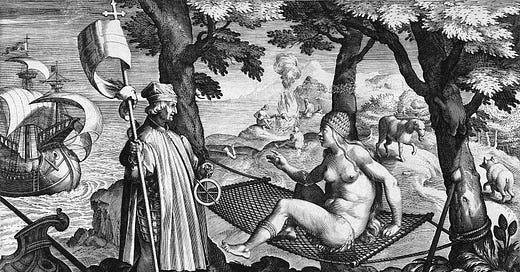Vespucci awakens a sleeping America: Allegory of the New World by Stradanus
I’m writing this from the airport before taking off for a family vacation, so this will perforce be a shorter wrap than I sometimes write. I will be spending America’s Independence Day and the couple of weeks after in the land that gave our country its name: Italy.
There’s something beautifully absurd about the fact that the most powerful country in the world was named so capriciously. Amerigo Vespucci is supposed to be the first European explorer to definitively claim that what we now call the Americas were continents previously unknown to Europeans. A German cartographer put a latinized version of his name—”America”—on what might be the first map depicting the new lands as genuinely new, and the name stuck.
That’s just a plumb unusual way to name a place as big and consequential as America. Compare to other continents. Africa likely derives from a Roman name for a North African tribe; Europe from a Mesopotamian for sunset, because it lies to the west; Antarctica, more recently, is so named because it on the other side of the earth from the Arctic. Countries are more diversely named, but America’s other settler states all have more straightforward origins. Canada’s name likely comes from a Huron-Iroquois word for “settlement,” because when Jacques Cartier stopped to ask directions of locals in what is now Quebec, they pointed him toward the nearest village, Stadacona. Mexico’s name (which is technically “The United Mexican States”) likely comes from the Nahuatl for “Place in the Navel of the Moon” because Tenochtitlan was built in the center of the Lake of the Moon. Brazil’s name comes for the Portuguese word for the trees that grew along its coast, and Argentina’s comes from the silver that the Spanish hoped to discover upstream of Río de la Plata.
But the United States of America is not named after the settlers’ European homeland, or an indigenous people’s term for the area, or a feature of the landscape or the local flora or fauna. It’s name comes from the continent, which in turn is named based on some guy’s idea of what would sound new and cool. It’s like being called The United States of Google. Which feels somehow weirdly appropriate.
In any event, posting may be sparse over the next several days. Hopefully nothing important will happen anywhere in the world.
On Here
Everything I’ve posted on this Substack this past week, like most of what I wrote the week before, was about the Supreme Court. Last week was abortion and gun rights. This week was religious freedom and the administrative state. I hope I don’t have to keep doing that. The core promise of the conservative jurisprudential movement when it first got going was that it would make the Supreme Court less central to our national political life. That doesn’t feel like where we’re going, but it’s still early days of a completely conservative-dominated Court, and there’s still plenty of time for the Court to settle on a more modest conception of its own mission.
The only thing I’ll add, given the holiday we’re celebrating this weekend, is that the Supreme Court is another exceptional American institution. I can’t think of any other country that professes such a deep well of veneration for its highest court, or conceives of that highest court as a kind of priesthood of professional interpreters of a sacred constitution. I’m not going to debate now whether that’s a good thing or a bad thing, just to note that it is very distinctively American.
Which suggests that, likely as not, we won’t stop passionately arguing about the Court any time soon, any more than we’ll stop playing a different football from everybody else.
Happy Independence Day.




